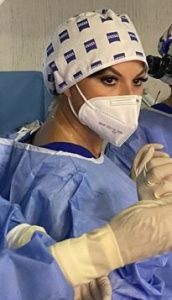What does it mean today to be a woman and to want to become an ophthalmologist at all costs and then aim to specialise in such a difficult surgical branch as vitreo-retinal surgery?
A woman and vitreo-retinal surgeon, Dr Manuela d'Aquino, a strong and determined personality that emerges from every statement she makes, tells us about the still difficult path a woman has to take to become a doctor and then to establish herself as an eye surgeon.
How did you choose your training in Ophthalmology and what is your current professional profile?

Hello, I am an ophthalmic surgeon, currently in charge of the ophthalmology outpatient clinic at the European Centre of Ophthalmology in Acicastello (CT), affiliated with the SSN.
I decided that I would become an ophthalmologist when I first entered an ophthalmologist's office for my first visit at the age of 6 and was fascinated by that world of special and technological instruments.
I grew up with the idea that the eye examination was not scary for children like other medical examinations, but was pleasant and fascinating. After specialising at the University of Catania, directed by Prof. Avitabile, I started my education with my foreign experience at the University of Copenhagen in Denmark, where I obtained my Phd degree.
I immediately became part of the European Centre of Ophthalmology family and dedicated myself to both private and contract work. I trained in refractive and cataract surgery with doctors Silvio and Marco Zagari, who welcomed me like a sister. My surgical training continued by dedicating myself to eyelid surgery, under the guidance of Dr Rizzotti, an ophthalmoplastic surgeon, who has passed on so much to me in this field, and then fulfilling my dream and finding my way in vitreo-retinal surgery, to which I am currently devoting myself every day under the guidance of Dr Silvio Zagari, who is training me to the full on this niche eye surgery.
My training as a doctor and surgeon is still uphill because I am facing particular difficulties, which unfortunately a woman often encounters. Being a woman doctor today is extremely difficult because of a whole series of discriminations, pressures, difficulties one has to face in order to assert one's status. And, if a woman has the ambition to make a career in surgery, which has always been thought of by men for men, the road becomes even more strewn with difficulties.
I often come up against the scepticism of patients who look at me doubtfully when I say: 'Yes, I will operate!
But what kept me going and got me where I am now was ambition and willpower, which perhaps only a woman can have. After all, a famous quote by Oscar Wilde says: "Give a woman the proper opportunities and there is nothing she cannot do".
Can you tell us about an unusual or particularly complex clinical case that you managed to handle and solve?
 I recently ran into a complication that I faced and solved in Femto LASIK surgery. I operated on a 32-year-old man for hypermetropic astigmatism using the Femto LASIK technique.
I recently ran into a complication that I faced and solved in Femto LASIK surgery. I operated on a 32-year-old man for hypermetropic astigmatism using the Femto LASIK technique.
During the lifting of the flap, I entered a superficial sub-epithelial plane, creating a kind of LASEK, probably due to a somewhat oedematous epithelium from the laser suction.
In fact, as soon as I realised this, because in some places the epithelium had opened up, I looked for a deep plane and lifted the LASIK flap.
After looking for the deep plane, lifting the flap and completing the treatment, I reassembled the epithelium, which had remained somewhat frayed, and put in a contact lens. At the check-up the next day I noticed a complete and perfect closure at the epithelial level, but with lots of deep infiltrates at the level of the stromal junction of the LASIK flap. I document everything with anterior OCT and make a diagnosis of diffuse lamellar keratitis (DLK), already at the third almost fourth stage with natural visus of 3/10.
DLK is a rare complication of LASIK, which unfortunately leaves serious and disabling outcomes in terms of visual quality if it is not treated promptly and correctly. Probably in a subject with a very reactive immune system, the fact of having created an epithelium-stroma disconnection above the flap triggered an autoimmune reaction that resulted in a DLK with a characteristic picture known as "Sahara sand".
At the same time, the patient confessed to me that he had not managed the postoperative treatment properly, forgetting to instill the prescribed antibiotic eye drops. I immediately performed a flap wash with resuspension and removal of inflammatory cells from the interface. Supplementing with dexamethasone eye drops every hour, the patient recovered his visus to 10/10 in a few days and restored corneal transparency.
This case served to make me reflect on the fact that such a complication must be treated promptly both medically and therapeutically, without having the fear of taking the patient back to the operating theatre to wash the LASIK flap because waiting would have resulted in serious sequelae to be resolved late.
A few tips for young colleagues starting out in Ophthalmology.
One piece of advice I can give to young people and, above all, to young women ophthalmologists: never stop dreaming and fighting for your dreams. There is an uphill road ahead in our environment, but perseverance and tenacity will be crucial for success. If it is surgery ... then it will be even more difficult!
Rely on a teacher to accompany you on this path, on a person who makes you feel at home, get back up at every fall and remember that the strings of an instrument play for one reason only: they resist pressure.... It is from that resistance that music is born.
As in life: it is from the ability to withstand pressure that your best music will be born.
Under the heading "I tell you a story..."
- "The more I like doing something..." - Italian ophthalmologist
Interview with Dr Silvio Zagari - Open up to the world!!! - Italian Ophthalmologist
Interview with Dr Miguel Rechichi - Every clinical case: an opportunity for growth - Oculista Italiano
Interview with Dr Marco Zagari - The 'allologist' is a thing of the past - Oculista Italiano
Interview with Dr Francesco Cerbella - Broadening our views - Oculista Italiano
Interview with Dr Pasquale Napolitano - Basic skills in each subspeciality - Oculista Italiano
Interview with Dr Beatrice Tombolini - Let your heart lead you too - Oculista Italiano
Interview with Dr Danilo Mazzacane - The privilege of caring for people - Oculista Italiano
Interview with Dr Giovanni Scandura - "Travelling a lot to learn... - Oculista Italiano
Interview with Dr Federica Fossataro - The best refractive solution for each individual patient - Oculista Italiano
Interview Dr. Antonio Randazzo
Editorial info
Our column is open to all ophthalmologists who are interested in telling their colleagues and our web audience about a clinical case.
We invite anyone wishing to participate in our publishing project to contact
Editorial Board 'l'Oculista italiano' - Ada Puglisi
Tel. +39 095 79.22.145
E-mail: info@oculistaitaliano.it
Or write to us using one of our contact forms
Information Request - Italian Ophthalmologist
Collaborate with us - Oculista Italiano
- https://ophthalmologybreakingnews.com/understanding-diffuse-lamellar-keratitis-after-lasik-surgery
- https://www.sciencedirect.com/science/article/abs/pii/S0181551221003429
- https://www.researchgate.net/publication/263205530_Diffuse_lamellar_keratitis_in_the_femtosecond-assisted_LASIK_flap_tunnel
- https://www.medscape.com/viewarticle/483399?form=fpf

